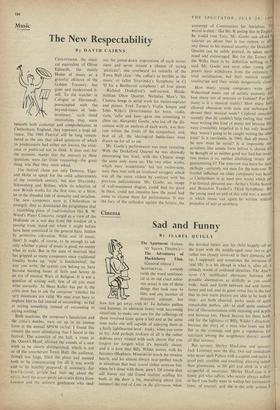M u sic
The New Respectability
By DAVID CAIRNS
The festival chose not only Debussy, Elgar and Hoist to speak for the solid achievements of the twentieth century, but also Stravinsky, Schoenberg and Britten, while its selection of new British works for the first time, at a blow, let in the dreaded tide of atonality and serialism. The new composers were at Cheltenham in strength; they so dominated the progra'rnme that mumbling piece of traditionalism like R. W. Wood's Piano Concerto, turgid as a view of the Midlands on a wet day from the window of a passing train, stood out where it might before have been unnoticed in the general haze, hidden by protective coloration. What sort of music, then? It ought, of course, to be enough to ask only whether apiece of music is good, no matter what its style. But in the state of neurosis that has gripped so many composers since traditional tonality broke up, 'style' is fundamental; the way you write, the system you belong to, have become burning issues of faith and heresy in an era of musical Wars of Religion. It is not a question of writing well; first of all you must write correctly. As Hans Keller has put it, the critic now has to ask the composer 'whether his very intentions are valid. We may even have to implore him to fail instead of succeeding: to fail at saying something instead of succeeding in saying nothing.'
Both reactions, the composer's fanaticism and the critic's doubts, were set up in an intense form at the annual SPNM recital. I found this concert the most stimulating that I heard at the festival. The acoustics of the hall, a room in the Queen's Hotel, allowed the sounds of a new work to be clearly distinguished, which is not so of the reverberant Town Hall; the audience, though not large, tilled the place and seemed both to be concentrating for all it was worth and to be humbly prepared, if necessary, for bewilderment; people had their say about the music. both the avant-garde advocates down from London and the military gentleman who read out his jotted-down impressions of each move- ment and never missed a chance of saying `pizzicato'; one overheard no remarks of the Town Hall class—The coffee's as terrible as the music' or (after Stravinsky's Symphony in C) '0 for a Beethoven symphony'; all four pieces —Richard Drakeford's well-turned, Hinde- mithian Oboe Quartet, Nicholas Maw's Six Chinese Songs (a serial work for mezzo-soprano and piano). Fred Turner's Violin Sonata and John Wilks's Divertimento for horn, violin, viola, 'cello and bass—gave one something to chew on; Alexander Goehr, who led off the dis- cussion with an analysis of each work, was first- rate within the limits of his sympathies; and, best of all, the ideological battle-lines were drawn up for all to see.
Mr. Goehr's performance was most revealing. With the Drakeford Quartet he was shrewdly penetrating but kind; with the Chinese songs the same only more so. The two other works, which were 'modernistic' but not twelve-note, were then rent with an irrational savagery which was all the more violent by contrast with his previous judiciousness. Mr. Goehr, an image of well-mannered disgust, could find no good in them, could not conceive how the panel had come to choose them for performance. It was the fury of the orthodox against the heretic..the contempt of Communism for Socialism. The moral is clear : like Mr. K jesting that in England he would vote Tory, Mr. Goehr can afford to tolerate an idiom that is too remote to 00 any threat to his musical security; the Drakeford Quartet can be safely praised, its talent teed nised and encouraged. But for the Turner and the Wilks there is by definition nothing to IS said. Mr. Goehr and most other young corn' posers have withdrawn from the extremity 01 total serialisation, but their outlook remains totalitarian and their minds dangerously closed' How many young composers write posh Weberniarr music out of artistic necessity and how many out of neurosis or fashion? For ho" many is it a musical reality? How many have allowed obsession with style and technique td devour their musical souls? Copland remarked recently that he couldn't help feeling that man` were writing this kind of music not because they' were irresistibly impelled to it but only because they 'weren't going to be caught writing the other kind.' is it inevitable, in 1960, that all music le be new must be serial? Is it impossible that serialism, like sonata form before it, should still be thought of as neither good nor bad but invert' lion makes it so, neither abolishing 'music' nor guaranteeing it? The note-row was born for man.
perhaps—certainly not man for the note-row. 115 fruitful influence on older compOsers was heard at Cheltenham in at least two works which pal it to limited. personal use—Seiber's Violin Sonata and Benjamin Frankel's Third Symphony. But the young need an end of this cold war, a detente in which music can again be written without prejudice of sect or snobbery.


































 Previous page
Previous page